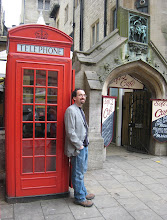First let me apologize to my readership for not having posted much recently.
Last december I spoke to one avid reader (yes, there is at least one person who claims to be an avid reader of my blog) who says he keeps reading it in hopes of actually learning something about science, but ends up learning about which airport I'm stuck in.
OK, so here is something cool that is sort of about science. It is known as Benford's law, and roughly it can be summarized by the statement:
Most numbers start with a small digit. About 30% of numbers start with the digit 1. Only about 5% of numbers start with the digit 9.
Huh? Yeah, this one drove me nuts in grad school, because it really depends on what you mean by "Most numbers". But here is a test just to prove the point. Write down a bunch of "random numbers" that you generate by looking at meaningful quantities (and this is important -- the numbers have to mean something, otherwise it doesn't work).
What is your housenumber in your address?
What page is the nearest book open to?
What day of the month is your birthday?
How many dollars (pounds, euros etc) are in your wallet?
How many miles do you drive to work?
How many books do you have in your house?
The chances that the answers to any of these questions start with the digit 1 are extremely high. The chance that any of them start with the digit 9 are very low.
Lets take as an example, day of the month for your birthday. Most months have about 30 days. Choosing a random number from 1 to 30, there are 11 numbers that start with the digit 1, and only one number that begins with the digit 9.
How about a random page in a book. Well if the book has exactly 9 pages, then all digits are equally probable. But if the book has 20 pages, then there is more than a 50% chance that the first digit of a random page begins with the digit 1. (and only 1 out of 20 begin with the digit 9). In fact, only if the book has 9, 99, or 999 will a random page be equally likely to start with the digit 1 as with the digit 9. Since very few books just happen to be exactly this long, 1 is always more likely than 9.
Of course you can cook up questions that do not follow this law: How many hands do you have? How many people does it take to tango? ... but for numbers that are "sufficiently" random, the law is very good.
Now for two final questions:
What year were you born?
What month of the year is it now?
Subscribe to:
Post Comments (Atom)

No comments:
Post a Comment